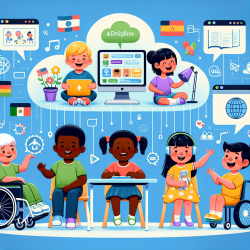Introduction
In the realm of healthcare, particularly maternal health, cultural sensitivity and safety are paramount. The study titled "Traditional Midwifery Contribution to Safe Birth in Cultural Safety: Narrative Evaluation of an Intervention in Guerrero, Mexico" highlights the profound impact of integrating traditional midwifery practices within indigenous communities. This blog explores the key findings of this study and offers insights for practitioners looking to enhance their skills and understanding of culturally safe healthcare practices.
Understanding the Study
The research conducted in Guerrero, Mexico, focused on supporting traditional midwives within their cultural context. The intervention aimed to revitalize traditional midwifery practices and foster collaboration between traditional and Western healthcare systems. The study's narrative evaluation involved 26 traditional midwives, 28 apprentices, 12 intercultural brokers, and 20 indigenous women, providing a rich tapestry of stories that underscored the intervention's impact.
Key Findings and Implications
- Revitalization of Traditional Practices: The intervention led to a resurgence of traditional midwifery practices, enhancing cultural safety and improving maternal health outcomes.
- Intercultural Dialogue: Intercultural brokers played a crucial role in bridging the gap between traditional and Western healthcare systems, facilitating communication and collaboration.
- Positive Health Outcomes: Communities reported improved maternal and neonatal health, with lower rates of perinatal deaths and complications.
- Challenges and Opportunities: The study highlighted challenges such as remuneration and the disinterest of younger apprentices, suggesting areas for further research and intervention.
Practical Applications for Practitioners
For practitioners, this study underscores the importance of cultural sensitivity and the value of traditional knowledge in healthcare. Here are some actionable steps:
- Engage with Cultural Practices: Understand and respect the cultural practices of the communities you serve. This fosters trust and improves health outcomes.
- Collaborate with Traditional Practitioners: Building partnerships with traditional midwives can enhance the delivery of culturally safe healthcare.
- Support Intercultural Training: Encourage the training of intercultural brokers to facilitate communication and collaboration between different healthcare systems.
- Advocate for Policy Changes: Work towards policies that recognize and support the role of traditional practitioners in healthcare systems.
Conclusion
The narrative evaluation from Guerrero, Mexico, offers valuable insights into the integration of traditional midwifery practices within healthcare systems. By fostering intercultural dialogue and supporting traditional practitioners, we can enhance cultural safety and improve health outcomes for indigenous communities. Practitioners are encouraged to explore these findings further and consider how they can implement similar strategies in their practice.
To read the original research paper, please follow this link: Traditional Midwifery Contribution to Safe Birth in Cultural Safety: Narrative Evaluation of an Intervention in Guerrero, Mexico.










